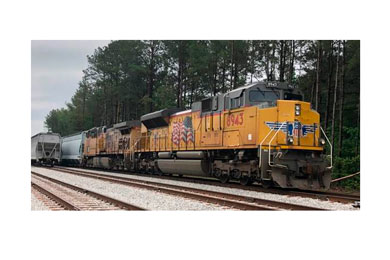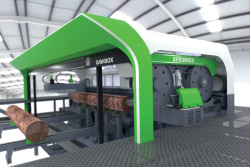The rail link has increased capacity to deliver more sustainable biomass from Drax’s LaSalle BioEnergy pellet plant in Louisiana, USA to its UK power station, taking thousands of trucks off local roads.
The $15 million rail link and other initiatives have already contributed to a $5/tonne reduction in Drax’s biomass production costs in 2019.
In its first year of operation, a new $15m rail link has increased the flow of sustainable biomass from one of Drax Group’s US pellet plants to its UK power station, reducing emissions and costs whilst increasing the resilience of the energy company’s supply chain.
The five miles of rail track connects Drax’s LaSalle pellet plant in northern Louisiana to the regional rail network, enabling freight trains to deliver the pellets to the company’s dedicated export facility at the Port of Greater Baton Rouge.
From there, the pellets are shipped to Drax Power Station in North Yorkshire, which supplies around 12% of the UK’s renewable electricity.
The new rail link allows Drax to deliver around 7,000 tonnes of sustainable biomass to the Port of Greater Baton Rouge in each train, compared to just 27 tonnes that could be transported by each truck previously.
Drax Biomass Senior Vice President Matt White said:
“The new rail spur has been a great success. Since it was commissioned last May it has significantly increased the amount of sustainable biomass we can deliver. It’s also taken thousands of trucks off local roads, unlocking carbon savings and costs in our supply chain as we build a long-term future for the sustainable biomass that provides millions of UK homes and businesses with renewable power.
“Biomass-generated electricity will be an important part of the global climate change solution. It supports healthy forest growth and biodiversity, while providing reliable, flexible renewable power, and could enable bioenergy with carbon capture and storage, known as BECCS – a vital negative emissions technology that will be crucial to meeting net zero targets.”
A team of up to 40 contractors worked through two of the wettest Louisiana winters in decades to clear the site, excavating around 180,000 cubic yards of dirt to level off the ground and stabilise it before three sets of rail tracks could be laid. The work also included installing conveyors to get the pellets to the new rail loading point.
Rafael Moreno, Drax Biomass associate director of engineering said:
“It was a huge amount of work and the wet winters certainly created some challenges. It’s hard to excavate when everything turns into mud. But the team pulled together and worked through the night to get the track laid and completed so the spur could be commissioned in May last year.”
The rail spur at LaSalle is part of Drax’s wider efforts to cut the costs of its biomass by around a third by 2027. The rail link and other initiatives, including the co-location of a sawmill at the LaSalle site last year, has already contributed to a 3% reduction in biomass production costs to $161/tonne in 2019 compared with $166/tonne in 2018.
Drax acquired the LaSalle BioEnergy plant in Urania in northern Louisiana in 2017. LaSalle BioEnergy is one of three US pellet plants owned by Drax. The three plants produce a total of 1.5 million tonnes of sustainable biomass pellets a year.
Photo: The first train arrives at the LaSalle plant in May 2019. By Rafael Moreno







